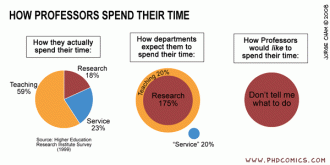As a follow-up to my post about great books in sociology last week, I called for readers to send in their own Top 10 lists. It has been fun to see those starting to come in. Here’s one from TSP blogger, Monte Bute, the self-styled “backstage sociologist.” Replete with an introductory explanation and annotations for each proposed volume, Bute suggesetd the title “A Populist’s Top Ten Sociology Books.” I tend to think of it as a classic, old-school list. Take it away, Monte.
Wayne Booth once argued that every composition strikes a “rhetoric stance”—an author, a subject, and an audience. Usually these elements are implicit; in this essay, I give you the “Full Monte.”
What is my persona? I am a populist sociologist, an outsider with a hardscrabble perspective. Lacking what Tillie Olsen called “the soil of easy growth,” I acquired my taste for great books not in seminar rooms but on the streets. Never disciplined by a sociology graduate program, I forged my chops experientially—as a deviant, dissident, and organizer.
What is my subject? It is a case for the ten best sociology books. But what do I mean by “best”? I sought books that allow the reader to achieve, in the words of C. Wright Mills, “a quality of mind that will help them to use information and to develop reason in order to achieve lucid summations of what is going on in the world and of what may be happening within themselves.” (By the way, The Sociological Imagination came in 11th on my list.)
The list is chronological without ranking. Perhaps surprisingly, it includes only volumes published between 1840 and 1959. I leave publications from the past 55 years to the test of time: Are they sprinters or long-distance runners? Consequently, you will find no “flavors of the decade” like Habermas, Foucault, Smith, Bourdieu, Chodorow, Wallerstein, Skocpol, Giddens, Hochschild, Bellah, Tilly, or Bauman.
Who is my audience? It is not the crème de la crème professional sociologists. I developed the list for undergraduate and graduate students and well-informed citizens (Who Virginia Woolf called the “common reader,” as opposed to the scholar). As an essayist, I stand with George Orwell: “Good prose is like a window pane.” While not all of my authors fully achieve this high standard, it helps explain why other candidates, like Parsons and most recent academic celebrities, are not on the list.
• Democracy in America Vol. 2 (Alex de Tocqueville)
If you are an aficionado of cultural or historical sociology, here is the man who wrote the book on both. Ironically, it took Habits of Heart to acquaint most American sociologists with Tocqueville’s masterpiece. He remains underappreciated as both a thinker and writer. As an aside, his Recollections is a first-person account of the French revolution of 1848, a compelling contrast with Marx’s interpretation.
• The Eighteenth Brumaire of Louis Bonaparte (Karl Marx)
This is Marx’s finest sociological work. When events confounded his polemics in The Communist Manifesto, he followed the evidence and revised his theory. In explaining the failure of the Revolution of 1848, Marx employs his most sophisticated use of class analysis. Written in white heat as a series of magazine articles, this is what public sociology is all about.
• Suicide (Emile Durkheim)
One could not leave out the foundational text of what Sorokin called “Quanophrenia.” Cliché or not, familiarity does breed contempt. It’s easy to forget how confounding in 1897 it was to argue that suicide was not just an individual act, but also a social fact su generis. The recent translation by Robin Buss better captures Durkheim’s lucid prose style than the earlier Spaulding and Simpson text.
• The Protestant Ethic and the Spirit of Capitalism (Max Weber)
Was he right? Was he wrong? Who cares! The way he constructs his argument is sociology’s finest example of the rhetoric of inquiry. How he begins by teasing out his research question, his subtle probing of Franklin and Baxter for “spirit” and “ethic,” his historical narrative of symbolic motivations without events or empirical data, his poetic and prophetic conclusion—this is a work of art, bringing to mind Huizinga’s masterful The Autumn of the Middle Ages.
• Soziologie (Georg Simmel)
Conventional wisdom dismisses Simmel as an “impressionistic” thinker. Because translation of this thousand-page tome took place in piecemeal fashion, readers of individual chapters saw only episodic brilliance. While the entire work is not conventionally “systemic,” it does possess a conceptual coherence—sociation as the guiding principle of his sociology. “On Individuality and Social Forms” best introduces this masterpiece.
• Twenty Years at Hull-House (Jane Addams)
This choice will bewilder only those who have not thoroughly examined her life and times. This volume is an example of genre bending, the autobiography as social theory (as is Du Bois’ Darkwater). She exemplifies feminist sociology, creative nonfiction, action research, as well as the activism of American sociology’s founding generation from 1900-1930.
• The Polish Peasant in Europe and America (W.I. Thomas and Florian Znaniecki)
Nearly inaccessible (a few used copies starting at $100) and forbidding (2,250 pages), it is a sacrilege that the ASA or the University of Chicago Press has not commissioned a 400-500 page abridged edition. It’s time to get beyond Blumer’s savaging of this work. The authors demonstrated that emigration and immigration are a seamless social process. To get a flavor of this tour de force, you need two volumes: under the same name, Eli Zaretsky has edited 127 pages of the personal documents; On Social Organization and Social Personality provides 157 pages of history, analysis, theory, and methodology.
• Black Reconstruction in America, 1860-1880 (W.E.B. Du Bois)
Sociologists belatedly canonized Du Bois, but in the process neglected this magnum opus of historical sociology. I am baffled that during the heyday of this subfield, Black Reconstruction garnered nary a mention. Working as a “plain Marxist” (Mills) rather than a dogmatic one, Du Bois refused to reduce race to class. He is the first to tease out the contradictions between race and class in American history.
• Social Theory and Social Structure (Robert K. Merton)
Only Weber and Goffman rival him as the 20th century’s most prolific entrepreneur of enduring sociological concepts. He is a far more eclectic and creative thinker than the caricature of him as a mere handmaiden of Parsons’ functionalism. Merton is perhaps American sociology’s finest prose stylist.
• The Presentation of Self in Everyday Life (Erving Goffman)
He turned the study of face-to-face interaction into a personal cottage industry. While he is perhaps the most important American sociologist of the 20th century, he, like Simmel, left no heirs. Ironically, sociological mandarins only begrudgingly tolerate his rule breaking because he was a genius. Au Contraire, he was a genius because he broke the rules. Like many of these authors, he writes craftily and, consequently, is a delightful read.
As the poet and linguist John Ciardi put it, “Good words to you.”




